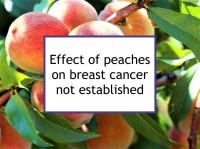Peaches (Prunus persica) contain some anthocyanins, beta-carotene, catechin, chlorogenic acid, epicatechin, lignans, oleanolic acid, quercetin and vitamin C. Peaches have antioxidant properties, as well as substantial bile acid binding potential, which has been associated with lower cholesterol and lower risks of heart disease and cancer.
Consumption of canned or dried peaches has been found to be associated with decreased risk of glaucoma.
Cancer-related effects of eating peaches
Maternal consumption of canned or dried peaches (i.e., non-fresh peaches) during pregnancy has been found to be associated with subsequent lower risk for the child of medulloblastoma/primitive neuroectodermal tumor (PNET), a common childhood brain tumor.
Peach consumption also has been found to be associated with reduced risk of head and neck and esophageal cancers. One study using an animal model reported that peach extract protected against liver toxicity caused by cisplatin, a type of platinum-based chemotherapy used to treat triple negative (ER-/PR-/HER2-) breast cancer and a variety of other solid tumors.
Peaches and breast cancer
While peaches incorporate several chemopreventive compounds, peaches are not an excellent source of any of the micronutrients that have been associated with reduced breast cancer risk or its recurrence.
For example, peaches are a greater source of the phytoestrogen lignan secoisolariciresinol than many other fruits. However, peaches incorporate only modest amounts compared to flaxseed and other lignan-rich foods.
Phytoestrogens are structurally and functionally similar to mammalian estrogens and can bind to estrogen receptors. When they do so, phytoestrogens can have either anti-cancer activity (which reduces ER+ cell proliferation and growth), or cancer-promoting activity (increasing proliferation and growth), or both (depending primarily on dosage). While peaches can be said to have estrogenic properties, they are mild and consuming peaches is not likely either to promote or inhibit proliferation and growth of estrogen responsive (ER+) breast cancer cells.
In fact, while peach extracts appear to have only weak anti-cancer effects in ER+ cells, they have been shown to inhibit estrogen receptor negative (ER-) breast cancer. Cell studies have reported that peach extracts can inhibit triple negative breast cancer cell growth and proliferation. In a study using an animal model of triple negative breast cancer, tumor growth and lung metastasis were reduced by peach extract.
Epidemiological studies have also reported that peach consumption is associated with reduced risk of ER- breast cancer among postmenopausal women. One study found that relatively high intake of peaches was associated with lower risk of ER- breast cancer. Another study reported that consuming at least two servings of peaches or nectarines per week was associated with significantly lower risk of ER- breast cancer.
Additional comments
Nectarines are essentially the same fruit as peaches (not a crossbreed between peaches and plums), but with a recessive gene that eliminates the fuzzy skin found on peaches.
Non-organic peaches and nectarines must be washed very thoroughly to remove pesticide residue as much as possible.
Anthocyanin and phenolic content and antioxidant activity is higher in peaches with yellow or reddish flesh than in light colored peaches such as white peaches, and is also higher in the peel than the flesh of peaches.
Sources of information provided in this webpage
The information above, which is updated continually as new research becomes available, has been developed based solely on the results of academic studies. Clicking on any of the underlined terms will take you to its tag or webpage, which contain more extensive information.
Below are links to 20 recent studies concerning this food and its components. For a more complete list of studies, please click on peach.
